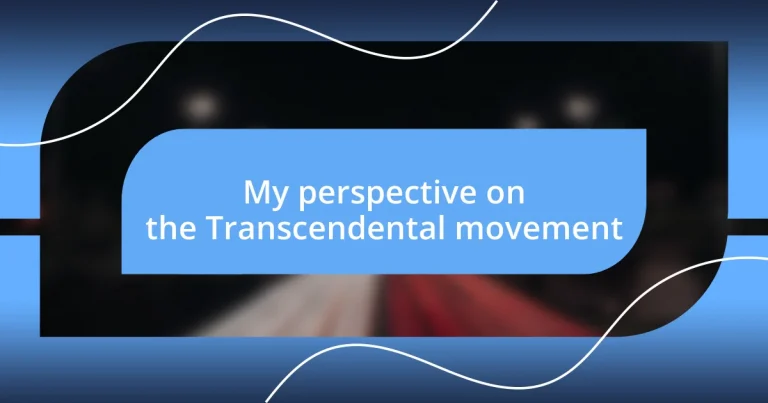Key takeaways:
- The Transcendental Movement emphasized individual intuition and connection to nature, inspiring figures like Emerson and Thoreau to advocate for self-reliance and personal exploration.
- Key principles of Transcendentalism include trusting one’s intuition, valuing nature, promoting inherent goodness, encouraging nonconformity, and advocating for self-reliance.
- While the movement has positively influenced personal growth and social reform, critics point out potential isolation, overly optimistic views on human nature, and the challenge of balancing high ideals with real-life complexities.
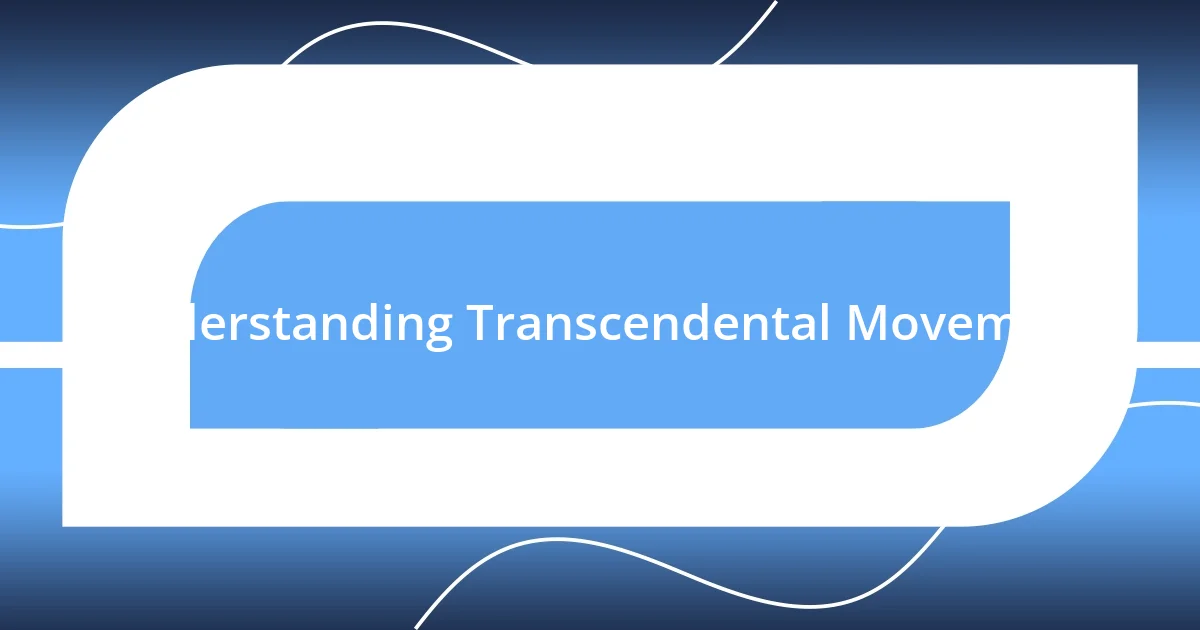
Understanding Transcendental Movement
The Transcendental Movement, emerging in the 1830s and 1840s, was more than just a philosophical perspective; it was a cultural shift aimed at exploring the inherent goodness of people and nature. I often reflect on how powerful that idea is—imagine believing that individuals can inherently connect to the divine without intermediary institutions. This concept really resonates with me, especially when I think about the times I’ve felt a surge of creativity or inspiration while immersed in nature.
At its core, Transcendentalism celebrates individual intuition and a deep connection to the universe. I remember a particular hike I took in the woods, where the quiet whispers of nature felt like a profound conversation with something greater than myself. Isn’t it intriguing how nature can evoke such deep philosophical questions in us? This movement emphasized that intimate bond, inspiring thinkers like Ralph Waldo Emerson and Henry David Thoreau to advocate for self-reliance and personal exploration.
The movement challenged societal norms and questioned established institutions, urging people to trust their internal compass over external authority. I often think about how difficult that can be—standing against the tide of expectation. Have you ever found yourself torn between societal pressure and following what you truly believe in? Embracing the ideals of Transcendentalism encourages us to navigate that tension, fostering a personal journey rich with authenticity and wisdom.
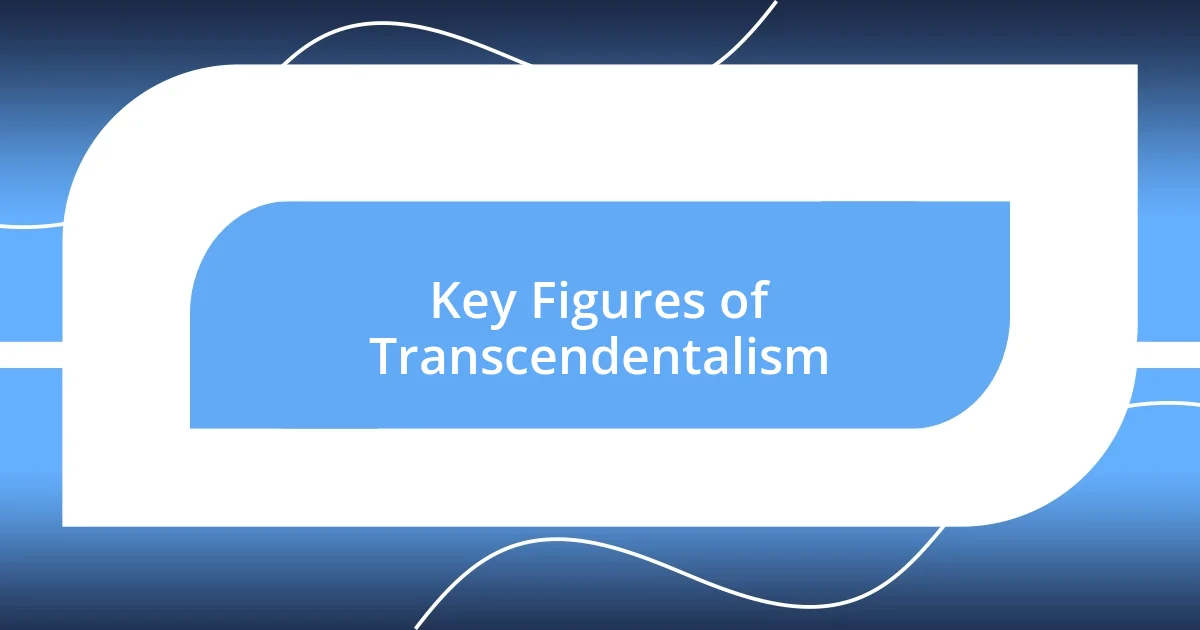
Key Figures of Transcendentalism
The Transcendental movement was shaped by remarkable figures whose ideas continue to resonate today. Ralph Waldo Emerson, often regarded as the movement’s leader, championed the notion of self-reliance and the importance of the individual spirit. I think about how Emerson’s essays can ignite a fire within, pushing me to trust my instincts no matter how unorthodox they may seem.
Henry David Thoreau, another pivotal figure, took Emerson’s ideas further, embodying them through his actions and writings. His experiment living simply at Walden Pond is a compelling testament to the value of nature in our lives. When I stumbled upon a quiet spot by the water during a challenging week, it reminded me of Thoreau’s quest for tranquility and reflection.
Margaret Fuller was equally significant, advocating for women’s rights and social reform within the framework of Transcendentalism. I can’t help but admire her courage; it inspires me to push for change and embrace my own voice in dialogue about equality. Each of these figures contributed unique perspectives, weaving together a rich tapestry of thoughts that still encourages deep reflection and action today.
| Key Figure | Contribution |
|---|---|
| Ralph Waldo Emerson | Emphasized self-reliance and individual intuition. |
| Henry David Thoreau | Advocated for simple living and deep connection to nature. |
| Margaret Fuller | Fought for women’s rights and social reform. |
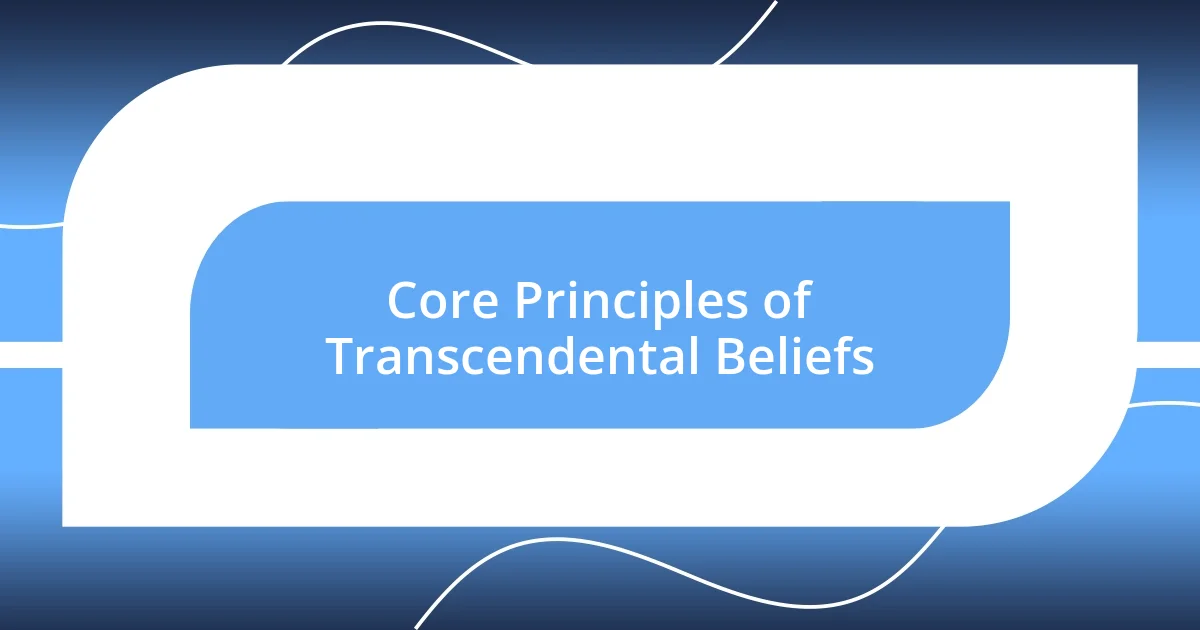
Core Principles of Transcendental Beliefs
The core principles of Transcendental beliefs revolve around the idea that individuals possess an innate goodness that can flourish when connected to nature and themselves. I recall a time when I sat quietly by a river, feeling an overwhelming sense of peace wash over me. It’s as if that moment illuminated the belief that our true essence is intrinsically tied to the natural world. Embracing this perspective encourages a fulfilling exploration of our inner selves.
Key principles include:
- Individual Intuition: Trusting one’s gut feelings and insights as a reliable source of truth.
- Connection to Nature: Valuing nature as a source of inspiration and a reflection of spiritual connectivity.
- Inherent Goodness: Believing in the natural goodness of people, which can lead to positive societal change.
- Nonconformity: Challenging societal norms and expectations to express one’s authentic self.
- Self-Reliance: Advocating independence and personal responsibility in thoughts and actions.
These principles not only provide a framework for understanding philosophical thought but also inspire personal growth and genuine connections with the world around us. I often find myself reevaluating my own beliefs in light of these tenants, questioning how I can live more authentically and in harmony with nature. Each of us has a unique journey, and these core tenets offer valuable guidance along the way.
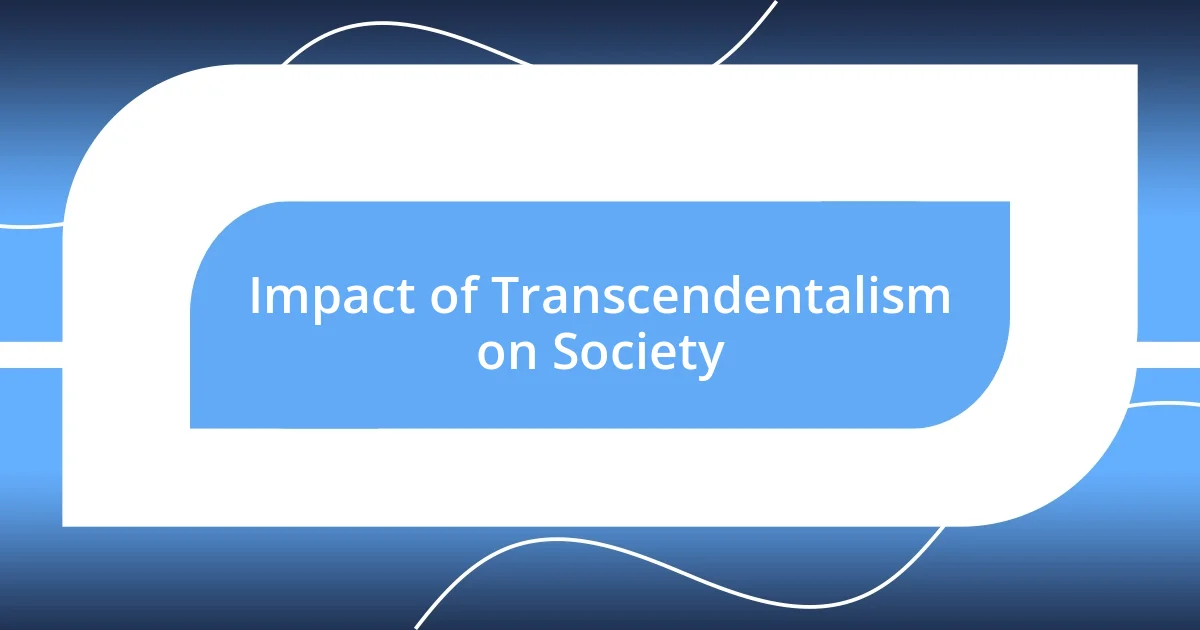
Impact of Transcendentalism on Society
Transcendentalism profoundly impacted society by encouraging individuals to seek their own truths and embrace authentic self-expression. I remember a time when I began journaling as a way to reflect on my thoughts and feelings, inspired by this very philosophy. It’s almost liberating to think that when we write from our hearts, we echo Emerson’s call for self-reliance, fostering a culture where individual voices matter.
The movement also sparked a wave of social reform, particularly in the realms of abolition, women’s rights, and education. I find it fascinating how Fuller’s advocacy laid the groundwork for future generations fighting for equality; her fearlessness still resonates with me. Isn’t it remarkable how the values of a few can ignite movements that pave the way for substantial change in society?
Moreover, Transcendentalism’s emphasis on connection to nature has contributed to the environmental movement we see today. Spend time outdoors, and you might feel the same awe I did during a recent hike, where the beauty of the landscape reminded me of my own place within the universe. This recognition of interconnectedness reinforces a communal responsibility to protect our planet, a legacy that ultimately aims to foster harmony between humanity and the Earth.

Personal Reflections on Transcendental Influence
Reflecting on the impact of Transcendentalism in my life, I often think about my experiences in nature and how they have shaped my understanding of intuition. There was a weekend trip where I camped under a starlit sky, feeling the vastness of the universe enveloping me. In that moment, I realized how profoundly connected we are to something greater. Have you ever felt that sense of belonging? It reminds me of Transcendentalists’ insistence on trusting our inner voice; it’s a powerful reminder of how deeply our lives are intertwined with nature’s rhythms.
One of the most striking lessons I’ve absorbed from this movement is the value of nonconformity. I recall standing at a crossroads in my career, torn between following a conventional path or pursuing my passion for art. Eventually, I chose the latter, and looking back, I see that choice as an embodiment of self-reliance. It’s empowering to break free from societal expectations; don’t you think it can lead to incredible personal discovery?
Lastly, the emphasis on inherent goodness within every individual resonates deeply with me. I once volunteered at a local shelter and was overwhelmed by the kindness I experienced, both from the staff and those we served. It struck me how, when given the chance, people consistently choose compassion over indifference. Doesn’t that reflect a core belief of Transcendentalism? This experience reinforced my conviction that embracing our shared humanity is essential for positive change, inspiring me to continue seeking and nurturing connections with others.

Modern Applications of Transcendental Thought
In today’s world, the principles of Transcendentalism find modern expression in practices like mindfulness and meditation. I recall attending a meditation retreat where the facilitator emphasized the importance of being present and tapping into our inner wisdom. It was a transformative experience, highlighting how these ancient ideas still hold relevance in our fast-paced lives—don’t you think it’s refreshing to pause and reconnect with ourselves?
The movement’s focus on individuality is echoed in today’s shift toward personalized learning in education. I vividly remember a time when I mentored a young student who thrived when given the freedom to explore her interests instead of adhering strictly to a curriculum. This approach mirrors the Transcendentalists’ belief that each person has unique insights to contribute, showing that education can be a deeply personal journey rather than a one-size-fits-all experience.
Moreover, the environmental consciousness inspired by Transcendental thought is more urgent than ever. I once participated in a community clean-up event where volunteers came together to restore a local park; it reminded me of Thoreau’s call to live in harmony with nature. Isn’t it inspiring to see how these values can inspire collective action? As we embrace these principles, we not only honor the past but also pave the way for a more sustainable future.

Critiques of Transcendental Ideals
While Transcendentalism promotes deep connection to nature and individualism, critics argue these ideals can lead to a sense of isolation. I remember a conversation I had with a friend who felt that the focus on personal intuition sometimes overshadowed the importance of community and shared experiences. Have you ever noticed how easy it can be to lose sight of our relationships when we’re busy seeking answers within ourselves? That perspective opened my eyes to the potential pitfalls of an overly individualistic approach.
Moreover, the idea of inherent goodness in all people, while uplifting, can seem overly optimistic. I once worked alongside someone who, despite his rough exterior, had a heartwarming story of resilience and change. It made me wonder, can we truly believe in the inherent goodness of everyone, even in the face of wrongdoing? This cognitive dissonance challenges the Transcendental belief, as it doesn’t always account for those who have faced significant adversity and may act out of pain rather than kindness.
Additionally, some critics argue that the pursuit of an ideal self can lead to discontent when reality doesn’t align with these lofty aspirations. I recall a time when I felt immense pressure to embody the self-reliant, enlightened individual celebrated by Transcendental thinkers. Instead, I found myself struggling with self-doubt. This often makes me question—how can we balance our high ideals with the messy complexities of real life? Sometimes, acknowledging our imperfections can be just as powerful as striving for greatness.












